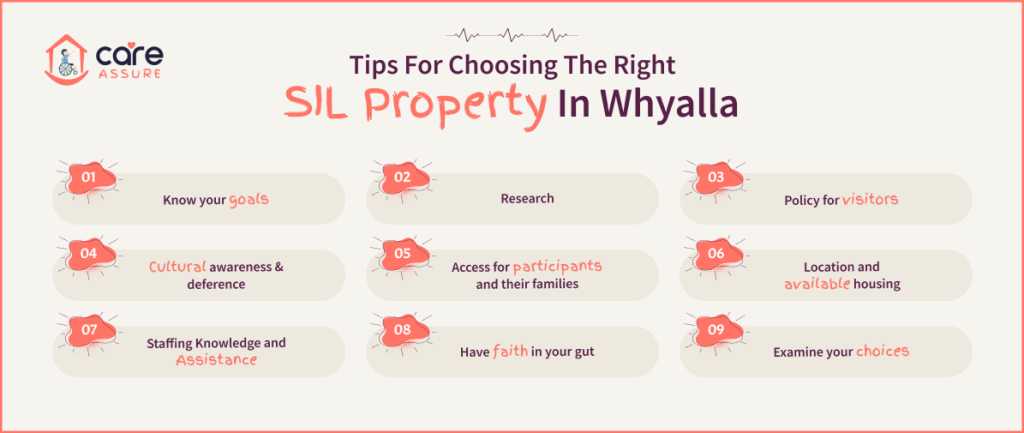Tips for Choosing the Right SIL Property in Whyalla
June 3, 2024
|By Careassure
|10 min read

The demand for SIL houses has been rising rapidly in Whyalla, a thriving community renowned for its breathtaking coastal scenery and rich cultural legacy, as people and families look for inclusive housing options that accommodate a range of requirements and preferences. Developers and housing providers have been working hard to create a variety of SIL properties customised to the specific needs of Whyalla people in recognition of this growing need. Starting the process of finding the ideal property is an important and thrilling choice. The stakes are much greater for people looking at Supported Independent Living (SIL) residences since you want a place that feels like home and offers the amenities and support you need to improve your quality of life. In this extensive guide, we'll get into the finer points of selecting the ideal SIL property specially designed to satisfy Whyalla locals' particular demands. From comprehending the notion of SIL to investigating crucial elements impacting your decision-making procedure, our goal is to furnish you with the information and perspectives required to create well-informed decisions that correspond with your tastes, desires, and needs.
Tips For Choosing The Right Sil Property In Whyalla
To choose an ideal SIL provider in Whyalla, go through the following tips.

1. Know your goals
Knowing your preferences and needs is crucial when you begin searching for a Supported Independent Living residence in Sydney. Your degree of independence and the specialised support services you require may fall under this category. You can obtain your NDIS assistance plans, where your specific needs should be listed if you cannot identify them. Additionally, make an effort to determine how long a day you require the assistance services. Having all of these insights can help you focus and reduce your possibilities.2. Research
This is one of the most important factors in locating the ideal SIL house in Sydney that is close to you. Investigate several SIL houses in your desired area to begin your hunt. In addition to asking friends and family who may have firsthand knowledge of SIL houses for ideas, you may also use internet information and local disability organisations. List possible choices that you want to look into more.3. Policy for visitors
Every home is unique, and occasionally, regulations are implemented limiting the quantity and timing of guests staying. Make sure you find out whether the house's visiting policy meets your needs by inquiring. Like everyone else, you want your new house to be a comfortable and functional place for you to live. A harmonious, well-balanced home depends on reaching that consensus.4. Cultural awareness and deference
Achieving cultural competence is crucial for several participants. Cultural competence is a plus, even if you don't consider yourself linguistically or culturally varied! A culturally competent provider creates a welcoming atmosphere for everyone. A SIL home where everyone feels respected and heard is ideal; is there anything better? Pick a group encouraging tolerance for people with different origins, morals, and worldviews. A good place to start is by looking for evidence of diversity and inclusion on SIL providers' websites and social media accounts.5. Access for participants and their families
Examine the provider of SIL's interactions and engagements with clients and families. How are you able to tell? Keep an eye out for candid conversation and camaraderie during tours or meet-and-greets. It's also encouraging when efforts are made to include you in creating your support.6. Location and available housing
It's critical to locate a provider who has access to decent SIL homes in handy areas. Find out what kinds of housing the SIL providers provide. There are many different kinds of SIL homes; some are ideal for single people, while there are also shareable and family-friendly options. Don't forget to assess the location's suitability. Do you prefer to live near your family or your friends? Do you wish to live close to where you work? Do you have a preferred location for a volunteer position, community group, or college? Do you regularly attend a reputable hospital or medical clinic? Public transportation is usually accessible from most SIL houses, but is it the best public transportation?7. Staffing Knowledge and Assistance
To travel internationally, you need insurance. The Australian government will not cover medical bills or other costs if something goes wrong. You are the one who is responsible for ensuring that you have the appropriate insurance that covers your impairment.You are required to inform your insurance company of your disability. Even if you do not believe it will impact your trip, your insurance company can reject any claim you submit if you do not disclose that you are disabled. There is no way for insurers to refuse coverage; otherwise, a discriminatory act would be committed. You should be aware, however, that obtaining coverage for your impairment may result in a higher premium, just as it does for any other pre-existing health condition.8. Have faith in your gut
In addition to experience and performance history, you should also take your intuition into account. Let's clarify. Your brain takes note of items in your surroundings that you are not consciously aware of, as you may already be aware of. These subconscious perceptions can give rise to both positive and negative sensations of "intuition." Therefore, if you have any uneasy feelings about a SIL provider, they can be more than simple feelings. When making a choice as significant as which SIL provider to select and rely on, it pays to follow your instincts.9. Examine your choices
Never accept the first one you come across. Your life will revolve around SIL. Thus, it's critical that your support system and home setting are appropriate for you. Make a list of the benefits and drawbacks of each SIL provider after comparing them. Next, ask people in your support system to assist you in making a decision.Questions To Ask Before Choosing a SIL Provider
Once you've narrowed down your options for SIL providers, contact the ones you've selected for a conversation to see if their services are a good fit for you. Here are some inquiries to think about posing:
Which services do you provide?
You can determine whether the services provided by SIL providers are in line with your needs and goals by learning about the variety of services they provide, including support for living arrangements, daily living assistance, community involvement, and skill development.Which lodging choices do you provide?
Inquire in-depth about the accommodations offered by a provider, including the kind of housing they provide and the facility's numerous accessibility features. Inquire about its location as well as whether there are any neighbouring locations that encourage social interactionHow do you encourage involvement in the community and in society?
One of the pillars of independent living is being involved in the community. Make sure to ask about specialised services and initiatives from the SIL provider you select that promote social and community participation.How much do your services cost, and are there any extra charges?
Even if your NDIS funding covers the services provided by SIL providers, it's vital to find out if they have additional costs. Making the most of the money allotted to your NDIS plan can be ensured by being aware of these additional expenses.Conclusion
The NDIS aims to give you more power! Your journey to more freedom and a more satisfying life is greatly influenced by the SIL provider you select. Thus, take your time, do your homework, and choose the provider that best suits your requirements, objectives, and tastes. It will feel possible to attain new heights when you have a supporting SIL provider! Make sure to contact Care Assure if you're still searching for a SIL provider who is trustworthy and dependable. Our SIL services are intended to support you in embracing an independent and opportunity-filled life by helping you gain new skills and manage everyday responsibilities so you can live a more independent life at home and in your neighbourhood. To ensure that you can live in secure and practical areas, we also offer lodging options. Reach out to us right away to find out how our tailored SIL support service may assist you in reaching your objectives and leading an independent life.
Frequently Asked Questions (FAQs)
Support services provided in SIL properties can vary based on individual needs and preferences. Common support services may include assistance with daily living activities, personal care support, meal preparation, medication management, transportation assistance, social and recreational activities, and access to allied health professionals such as therapists and nurses.




